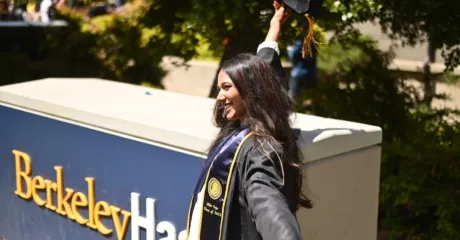At more than 100 years old, the University of Georgia’s Terry College of Business has a deep history steeped in innovation and high-quality undergraduate business education. This year, the B-School soared up 13 places in the Poets&Quants 2023 rankings – landing in No. 64 compared to No. 79 in last year’s 2022 rankings.
Terry had a more selective acceptance rate of just 40% for the most recent incoming class in contrast to last year’s 48.02% rate. Their average SAT score was 1276 for the most recent incoming class – down a bit from last year’s score of 1287.
As far as employment outcomes go, 78% of the Class of 2023 landed at least one business focused internship before graduation, up just a percentage from last year’s 79% for the Class of 2022. A total of 92.08% of the Class of 2023 secured employment within three months of graduation – down a touch from last year’s 96.27% for the Class of 2022. Of the three methodological categories, Terry scored highest in Admissions, landing at No. 36.
Founded as the School of Commerce in 1912 and awarding its first bachelor of science in commerce in 1915, Terry was the first business school founded in the southern United States. While the school’s age is dated, the innovation coming from the school is not.
“We’ve had some dedication to some smaller programs,” says Henry Munneke, the associate dean of undergraduate programs at Georgia Terry, noting the school’s Music Business Certificate. “Those are ways students can come in and be a traditional finance major but, hey, if they have an interest in music or the music business, they can use their electives to go through and out the Music Business Certificate.”
EVERY STUDENT ATTENDING UGA MUST COMPLETE AN EXPERIENTIAL LEARNING PROJECT
After being accepted to the University of Georgia, students may enter the Terry College as juniors. The school says students “self-select” on if they should apply to the college or not, which requires a minimum 2.6 GPA at the University of Georgia, three required prerequisite courses, a purpose statement, and passing a proficiency profile exam.
Once in the program, all students must complete Financial Management, Principles of Marketing, and Principles of Management in their first semester. By the end of the second semester, they must also complete Predictive Modeling and Optimization, the school’s required course in business analytics.
Students may also choose their major upon entrance and begin working towards the 30 required hours of Terry-specific courses to graduate. Interestingly, Munneke notes, the University of Georgia is the largest university to require all undergraduate students to complete an experiential learning requirement. “That’s bringing the classroom to the world,” he insists. “We are the largest university to require that of all of its students.”
While Munneke was quick to praise the school’s strengths in specific majors such as Risk Management and Insurance and Real Estate, he also noted newer initiatives the school’s leadership is particularly pleased with.
Munneke says the program used to sit within the management department — typical to entrepreneurship programs across B-schools. Students from across disciplines, like the sciences and engineering, in particular, pursuing the certificate or at least taking entrepreneurship courses. “We’re trying to get those students who may not traditionally be business students to come out and see that they do need some background in business,” Munneke adds.
NEW ONLINE BBA COURSES ‘WILDLY’ POPULAR AMONG STUDENTS
Another substantial addition is the online BBA. Designed as a “finishing degree,” Munneke says it has “been a great way to meet military needs.” Faculty teaching online are the same residential Terry faculty, and the program has also significantly increased the number of online courses available for traditional students. “If the students are doing a summer abroad or something away from campus, they can take a course if they want,” Munneke says, noting the online courses have been “wildly” popular for the traditional students.
A FOCUSED, PROFESSIONAL STUDENT POPULATION
In terms of student culture, Munneke says the students are mainly excited to focus on a major once they enter the school and then they are very engaged in finding jobs.
“When the students get here, they are excited to focus on what they want to study. They are professional and focused on their education,” Munneke says, also noting the school’s Student Service and Corporate Relations office, which provides a robust employer engagement and mentoring program that taps into nearby Atlanta.
“Our message is, yes our alumni are Terry, yes the faculty are Terry, but we want you to know from the first day in the college, you are the Terry College of Business,” Munneke says. “And together, we want to build a strong program that reflects what the business world wants and what makes you successful.”
Alumni Say:
“My Senior Thesis Project was a transformational project for me. I was able to really process ideas and research with professors and students. My Capstone project with the MSBA program was also perfect for me. I was able to see real-world problems and collaborate on them. This capstone project actually assisted me in getting a Job at AdVic.”
“The Risk Management and Insurance program concludes with a capstone project that helps students prepare for real world insurance scenarios. We performed an entire risk analysis of a local company which helped us sharpen our networking, analytical thinking, and presentation skills.”
“I wrote an economic thesis paper about the effect of the Rams leaving St. Louis where they were offering them public funds to build a stadium in order to move to Los Angeles where they would fund building their own stadium.”
“I was in the music business program and we had two semesters of working on big projects and internships that were all involved in getting out there and doing something in the music business world. I wrote a thesis of where I thought the future of music publishing was going and it became a runner-up submission in the GrammyU business competition.”
“I voluntarily participated in the Terry Professional Sales Competition. This was PIVOTAL in my career into sales. This helped me network with many companies chomping at the bit to get me as their sales intern. Because of this I was able to network with my dream company, LocumTenens.com and get a full time job there.”










